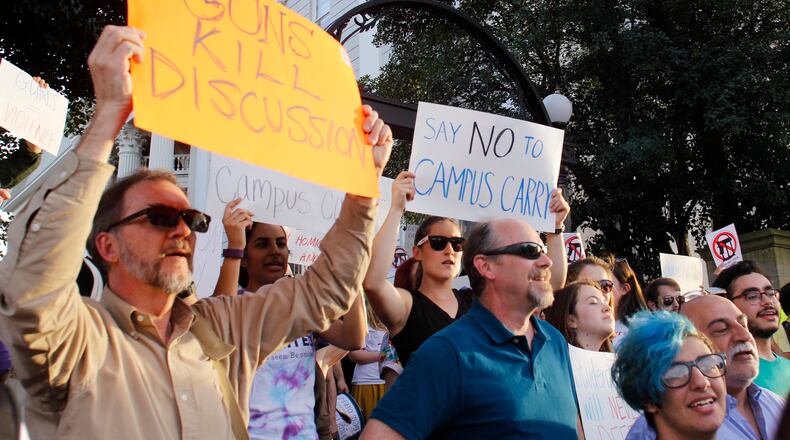Advocates of campus carry probably don't care that guns on campuses will push top faculty -- those in highly sought-after disciplines -- to leave. They are likely to say "good riddance," believing Georgia's public campuses are better off without opponents of guns on campus.
It would be a mistake for Gov. Nathan Deal to adopt that irresponsible position as he considers whether to veto House Bill 859. The prestige of Georgia Tech has helped Georgia attract and keep tech companies. The school already cannot compete with the salaries of private colleges; the state Legislature and governor ought to listen to the concerns of faculty -- folks on the campuses rather than in the gun-free halls of the Gold Dome -- about armed students in classrooms.
Without its celebrated computer science, math and engineering professors, Tech will not be able to attract the brilliant students who have made it world-renowned.
To that end, here is a sobering assessment of what campus carry will do to Tech and the University of Georgia by Brian Stone, an associate professor in the City and Regional Planning Program of the Georgia Institute of Technology, where he teaches in the areas of urban environmental management, land use, and transportation planning. Stone's program of research is focused on the spatial drivers of urban environmental phenomena, with an emphasis on climate change and air quality.
By Brian Stone
With the passage of House Bill 859, a law allowing students to bring guns into their public university classrooms, Georgia’s elected leaders are undertaking an unprecedented educational experiment: How quickly can one of the most highly ranked and regarded public universities in the world be knocked out of the top 10? For, while a handful of other states have passed a campus carry law, none can claim a top 10 ranking.
The Georgia Institute of Technology, now ranked 7th among public universities by US News and World Report, is a point of pride for the University System of Georgia and a major economic asset to the state as a whole. Not too far behind is the University of Georgia –ranked 21st in the nation. If you doubt that a decision to allow students to bring loaded guns into the heart of these universities will impact their national standing, you may not appreciate how difficult it is to maintain these high rankings – or their direct economic value to degree holders.
The most actively recruited faculty and students who come to our universities each year have options to go elsewhere. And, as the vast majority of Georgians believe guns on university campuses make them less safe rather than more (the polling on this question is uniformly devastating for supporters of campus carry, with almost 80 percent of Georgians opposed to the bill), a significant number of families will choose a campus that meets their expectations of safety.
The potential for Georgia Tech, the University of Georgia, and other Georgia universities to see their national rankings continue to rise while some percentage of top faculty and students opt to go elsewhere is, at best, improbable. In the highly competitive world of academic recruiting – and with the vast majority of university faculty vehemently opposed to having guns in their classrooms – the assertion that campus carry will not impact university rankings in Georgia is a dog that just won’t hunt.
So, why should the average Georgian be concerned about a decline in the national rankings of our universities? The most basic reason is simple economics. With the stroke of Gov. Nathan Deal’s pen, the economic value of a degree from Georgia universities will begin to erode as our ability to recruit and maintain top talent is undermined. With campus carry, a degree from Georgia’s most highly ranked universities will soon become a depreciating asset.
More immediate than these economic repercussions will be fundamental changes in the educational experience of students. As is already playing out at the University of Texas at Austin, the only other top 20 university where guns are allowed in classrooms, nationally prominent faculty members are leaving, heavily recruited applicants have cited the law as the reason for going elsewhere, and professors are being advised by administrators to avoid controversial topics in the classroom.
My own informal survey of colleagues at Georgia Tech reveals that many will immediately limit their availability to meet with students outside of class, discontinuing the direct access to professors that is central to advanced education. Others will develop more online course content, in an effort to limit exposure to hostile or accidental gunfire in the classroom (in campus carry states, at least four accidental shootings are already on record). All are polishing their resumes.
As a proud native of Georgia, a graduate of our University System, and a professor at Georgia Tech, my parting advice to friends concerned about the effects of campus carry is dispiriting: If you seek for your children a college degree that will grow in value over time, send them out of state.
About the Author
Keep Reading
The Latest
Featured



